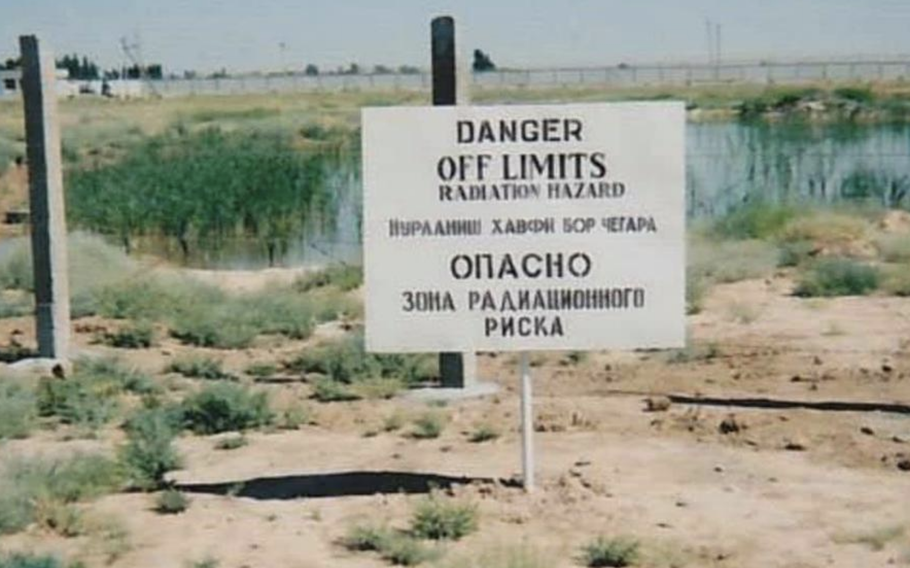
A signed posted outside the Karshi-Khanabad Air Base in Uzbekistan warned of radiation at the former Soviet military installation, where thousands of U.S. military forces were deployed from 2001 to 2005. K2 veterans reporting seeing chemical residue from old weapons and jet fuel oozing from the ground at the base. (Mark Jackson, a former Army staff sergeant who served at Karshi-Khanabad Air Base.)
WASHINGTON — Acute and chronic leukemias and other life-threatening cancers will now be recognized as presumptive conditions for toxic-exposed veterans who served during the past 25 years in Afghanistan, Iraq, Kuwait, Saudi Arabia and across the Middle East, the Department of Veterans Affairs announced Wednesday.
Veterans deployed to specific locations in the Middle East during the Gulf War and after Sept. 11, 2001, will have a lower threshold to prove the cancers are related to their exposure to hazardous substances during military service to qualify for medical treatment and disability pay, the VA said.
The VA will automatically assume a service connection for the following diseases that develop in the blood and bone marrow: acute and chronic leukemias, multiple myelomas, myelodysplastic syndromes and myelofibrosis. The coverage goes into effect starting Friday.
VA Secretary Denis McDonough said Wednesday at a news conference that the VA has particular interest in helping veterans diagnosed with cancer following exposure to industrial solvents and chemical weapons at Karshi-Khanabad, also known as K2, a former air base in Uzbekistan. About 16,000 veterans served at the base, which borders Afghanistan, from 2001 to 2005.
“Covering multiple myeloma, leukemia and rare cancers is important to our K2 veterans,” McDonough said.
The inclusion of several cancers for VA coverage follows a review by the agency on the prevalence of cancer in veterans who had served at certain installations, including K2.
“We need to get to the bottom of what was [at K2]. It was a toxic soup,” McDonough said, referring to hazardous waste present throughout the former Soviet military installation, which contained abandoned chemical weapons, depleted uranium and industrial solvents pooling from the ground.
Establishing the presumptive conditions is a significant step for K2 veterans with serious illnesses to access care, said Matthew Erpelding, executive director of the Stronghold Freedom Foundation, which advocates for K2 veterans.
An Army study conducted in 2015 found K2 veterans had a 500% increased risk of developing certain cancers, including brain, colon, thyroid and pancreatic cancers.
“While this expansion is a welcome development, it is clear that more needs to be done. The health effects of K2 service extend beyond these conditions, and the time to address these broader issues is now,” Erpelding said. “Comprehensive action is needed to ensure that all K2 veterans receive the care and recognition they have earned.”
The VA also is extending coverage for diseases connected to breathing matter from burn pits and other sources of airborne pollution during deployments in the Middle East. The diseases are urinary bladder, ureter cancer — also known as renal-pelvic cancer — and related genitourinary cancers.
The new presumptions apply to veterans on active duty in southwest Asia or Somalia during the Gulf War and in Afghanistan, Syria, Djibouti, Uzbekistan, Egypt, Jordan, Lebanon and Yemen during the Gulf War or after Sept. 11, 2001, according to a notice published Jan. 2 in the Federal Register.
“This airborne pollution includes smoke from oil well fires, sand, dust, mechanical fumes from aircraft, vehicle, and ship engines, wood, plastic, rubber, metals, munitions, chemicals, and food and human waste,” according to the notice. “Incomplete combustion of organic and inorganic material in burn pits results in high volumes of toxic particulate matter in the air that includes metals, benzene, and other toxic compounds.”
Under the Sergeant First Class Heath Robinson Honoring Our Promise to Address Comprehensive Toxics Act, or PACT Act, the VA extends benefits including health care and disability compensation to former service members who developed illnesses following exposure to hazardous materials while on active duty.
More than two dozen medical conditions are covered, depending on the deployment and dates of service for affected individuals. Medical conditions include chronic bronchitis, chronic obstructive pulmonary disease, emphysema, brain cancer, gastrointestinal cancer, head cancer, melanoma and neck cancer.
The PACT Act removed the requirement for veterans to prove that identified exposures from burn pits, Agent Orange, radiation, asbestos and other toxins caused more than two dozen different illnesses. Nearly 5 million claims for benefits have been submitted since the PACT Act became law nearly three years ago.